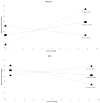Perceived control moderates the influence of active coping on salivary cortisol response to acute pain among women but not men
- PMID: 20060650
- PMCID: PMC2875290
- DOI: 10.1016/j.psyneuen.2009.12.003
Perceived control moderates the influence of active coping on salivary cortisol response to acute pain among women but not men
Abstract
It is generally established that active-coping strategies and greater perceived control over pain are associated with improved pain-related outcomes; however, it remains unclear whether these factors independently or interactively influence adrenocortical function in reaction to a painful stimulus. The present study examined whether active coping predicted magnitude cortisol response to acute pain, whether perceived control over pain moderated this association, and whether effects differed as a function of sex. Our findings suggest that perceived control moderates the active coping-adrenocortical relation among women but not men, such that active coping may augment the release of cortisol in response to a painful stimulus only in the presence of greater perceived control over pain. Taken together, active coping and perceived control may potentiate an adaptive neuroendocrine response to an acute painful stressor.
Copyright 2009 Elsevier Ltd. All rights reserved.
Conflict of interest statement
All authors declare that they do not have any conflicts of interest.
Figures
References
-
- Chrousos GP. Stressors, Stress and Neuroendocrine Integration of the Adaptive Response: 1997 Hans Selye Memorial Lecture. Ann N Y Acad Sci. 1998;851:311–335. - PubMed
-
- Edwards RR, Fillingim RB. Styles of coping predict cardiovascular function following a cold pressor test. Pain Res Manag. 2005;10:219–222. - PubMed
-
- Gaab J, Blattler N, Menzi T, Pabst B, Stoyer S, Ehlert U. Randomized controlled evaluation of the effects of cognitive-behavioral stress management on cortisol responses to acute stress in healthy subjects. Psychoneuroendocrinology. 2003;28:767–779. - PubMed
-
- Gaab J, Sonderegger L, Scherrer S, Ehlert U. Psychoneuroendocrine effects of cognitive-behavioral stress management in a naturalistic setting: A randomized controlled trial. Psychoneuroendocrinology. 2006;31:428–438. - PubMed
Publication types
MeSH terms
Substances
Grants and funding
LinkOut - more resources
Full Text Sources
Medical


